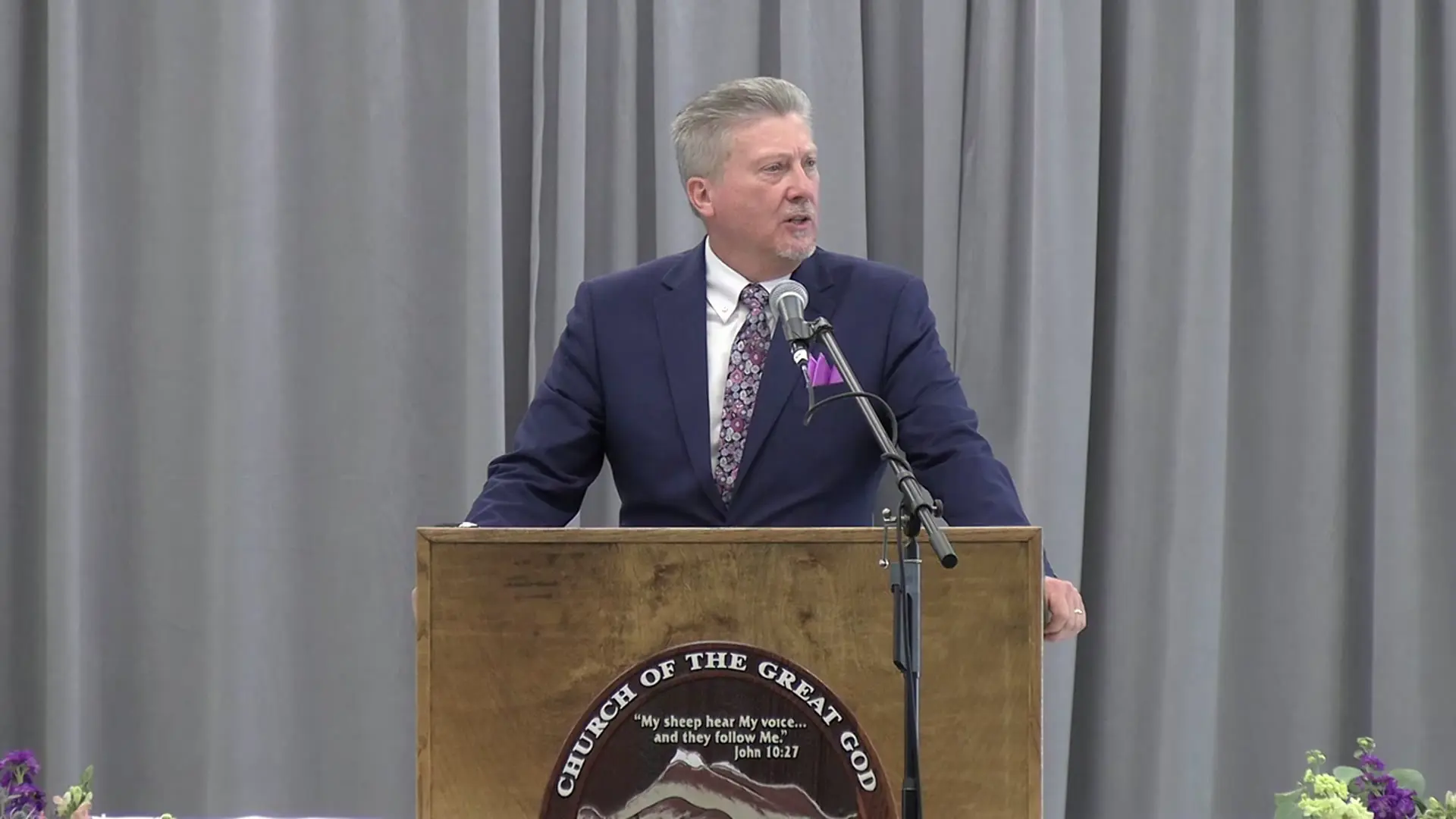Filter by Categories
The Last Words of Jesus Christ
Sermon by Martin G. CollinsJesus Christ, as a flesh-and-blood human, walked among people who struggled to grasp His true identity. Many were confused, with some believing He was a prophet like Elijah or Jeremiah, while others thought Him mad or possessed by a demon. Even those close to Him, including His own townspeople, questioned His sanity, saying, "He is out of His mind." His disciples, too, often misunderstood His mission, expecting a human Messiah to lead Israel to political glory rather than recognizing His deeper purpose. Despite His miracles and authoritative teaching, which astonished crowds and unsettled the educated elite, doubt and confusion persisted about who He was. As a human, Jesus experienced the full range of physical and emotional struggles. He was born of a woman, Mary, and lived with human nature, subject to temptation and suffering just as we are. He felt thirst on the stake, requesting a drink from those around Him, showing His real humanity in the agony of crucifixion. His life resided in His blood, and when it was shed, He gave His life completely, dying as a mortal man. For three days and three nights, He was dead, not merely a spirit in a body, but fully flesh and blood, changed into a human form that could die. His cry, "My God, My God, why have You forsaken Me?" revealed the depth of His human experience, feeling utterly alone and cut off from the Father as He bore the weight of sin. Jesus, as flesh, was not separate from His human body but became entirely human, partaking of flesh and blood in the same way we do. His death was real and complete, not a mere illusion or partial act. He suffered, died, and was revived by the Father, having been changed into mortal flesh for the purpose of dying. His human life, given through the shedding of His blood, held a value beyond that of all humanity combined, paying a price that only He could. In His final moments, He expressed human needs and emotions, yet remained focused on fulfilling His mission, declaring, "It is finished," as He completed His work as a mortal man.

Jesus in the Feasts (Part Five): Tabernacles
Feast of Tabernacles Sermon by Richard T. RitenbaughIn the context of the Feast of Tabernacles, Jesus Christ is presented as our eternal dwelling place, our true home. The symbolism of the tabernacle or booth, central to this feast, points directly to Him, not merely as a temporary shelter but as a permanent abode under the New Covenant. John 1:14 reveals that the Word became flesh and tabernacled among us, emphasizing that Jesus truly took on human form, living among humanity under the same conditions we face. He was not a phantom or a divided being but a real flesh-and-blood human, sharing in our existence while retaining His divine nature. His choice to dwell in flesh, rather than a mere tent as in the wilderness Tabernacle, made His presence more personal and relatable, allowing Him to walk side by side with us. This act of tabernacling among us displayed His glory, not through overwhelming power, but through grace and truth, reflecting the same character revealed to Moses in Exodus 34:6. Though His divine radiance was dimmed for our protection, His righteous nature remained unchanged, showing us how to live a perfect human life. Furthermore, in John 15, Jesus speaks of abiding in Him, using the metaphor of the vine and branches to illustrate that we, as His chosen ones, must remain in Him, attached to Him as our dwelling place, not just for a finite time but for eternity. This abiding relationship signifies a profound closeness, far beyond the physical booths of the Old Testament, where He desires us to be with Him forever as part of His eternal family.
Ecclesiastes and Christian Living (Part Eight): Death
'Personal' from John W. RitenbaughJesus Christ, as a flesh-and-blood human, became mortal to identify completely with humanity. He lived a sinless life, escaping the mandatory death penalty that sin imposes. Through His death, He paid a tremendous price to free us from the fear of death, breaking the hold of Satan over us. By living without sin, He defeated Satan, who holds the power of death, stripping that weapon from his hands. As we are one with Christ, the threat of death no longer looms over us. His substitutionary death was necessary to release us from bondage, as nothing less than the death of our sinless Creator, living as a man, could suffice. Furthermore, He remains our living High Priest, ensuring we stay free from backsliding into bondage, and His work unites us with Him in the same Family, offering the hope of everlasting life through God's calling and faith.

Christ Coming in the Flesh
Sermon/Bible Study by Richard T. RitenbaughJesus Christ came into the world as a flesh-and-blood human, a necessary condition to redeem mankind from sin. He had to be human to pay for human sin, embodying a nature so pure and valuable that His sacrifice could cover all sins for all time. As a man, He experienced the fullness of human life, born of a woman, subject to the law, and possessing blood, visibility, and the capacity to die—attributes unique to humanity. He was seen, heard, and touched by His disciples, confirming His physical presence among them. Throughout His life, Jesus retained His essential character as God while living as a material man, embodying as much of God's nature as a human could hold. He was born through the Holy Spirit to Mary, developing as a human child, yet recognized as the Son of God and the Son of Man due to His divine and human origins. His humanity was evident in His birth, His obedience, and His suffering, culminating in His crucifixion, where He shed His blood and declared His work finished. His glory as the only begotten of the Father shone through His actions and words, full of grace and truth, revealing God's goodness. Witnesses, including angels, Gentiles, and the world, testified to His human presence, and His resurrection further affirmed His mission. Jesus, as Immanuel—God with us—fulfilled prophecies from the foundation of the world, being the Seed of the woman, powerful and righteous enough to overcome sin and become the Redeemer. The importance of acknowledging Jesus Christ as a fleshly human being is foundational. Denying His humanity undermines God's plan of redemption, rendering His sacrifice ineffective, as only a human could atone for human sin. Those with the Spirit of God confess this truth, understanding that Jesus, in His human form, accomplished the work of salvation, offering forgiveness and the hope of eternal life in God's Kingdom.
Hebrews (Part Four): Who Was Jesus?
Sermon by John W. Ritenbaugh (1932-2023)Jesus Christ was not just an extraordinary man, but also possessed the massive intellect needed to create, design and implementing all manner of life—He was God.
Was Jesus Dead?
Herbert W. Armstrong BookletCan God die? Was Jesus really dead, or did only His body die? Was Jesus the Divine One alive during the three days and three nights a body was in the tomb?
Jesus Is God
Sermon by John W. RitenbaughJesus Christ is the Word, by whom the world was created. He has always interfaced between mankind and the Father, having primacy as our Lord, Master, and Ruler.
The High Christology of Colossians
Sermon by Richard T. RitenbaughHigh Christology as a doctrinal stance was not enough to prevent the eventual apostasy of those in Asia Minor. Doctrine must produce the right conduct.
Four Views of Christ (Part 2)
Sermon by John W. RitenbaughThe Gospels are Christ's biography. They also illustrate the typology of Revelation 4:7 depicting a lion, ox, man, and eagle, giving a picture of Christ's character.
Four Views of Christ (Part 5)
Sermon by John W. RitenbaughLuke's gospel portrays Christ as the son of man, the high priest of man, and the savior of man, having all the feelings, compassions, and aspirations of man.
Intimacy with Christ (Part Four)
Sermon by John W. RitenbaughWe don't really know something unless we have experienced it. Knowing God manifests itself in the way one lives, reflecting faithfulness and obedience.
Love's Basic Definition
Sermon by John W. RitenbaughLove is not a feeling, but an action—defined as keeping God's commandments, the only means by which we can possibly know Him, leading to eternal life.

Fully Man and Fully God?
'Personal' from John W. RitenbaughJesus Christ is called both 'Son of Man' and 'Son of God,' raising weighty questions about His nature. Could He have both full humanity and full divinity?
Fully Man and Fully God? (1994)
'Personal' from John W. RitenbaughJesus Christ is often misunderstood. The phrase 'fully man and fully God' does not have biblical support; Christ's real nature is much more meaningful.
Deceivers and Antichrists (Part One)
CGG Weekly by David C. GrabbeJohn's epistles are the only places the term "antichrist" is used. This word has taken on a life of its own, especially within Evangelical Protestantism.
Whatever Happened to Gnosticism? Part Two: Defining Gnosticism
Article by David C. GrabbeWe can glimpse Gnosticism in Paul's epistles to the Galatians and Colossians, in which he combats Gnosticism's twisting of the truth of Jesus Christ.
What Is 'Son of God'?
Sermonette by Richard T. RitenbaughOur concept of God determines how we will worship Him. The fact that so many misunderstandings about Him indicates His people didn't listen to Him.
Priceless
CGG Weekly by Richard T. RitenbaughChrist's sacrifice is often not as real as it needs to be, but what He and His Father did for the elect, and ultimately, most of humanity, is priceless
The Father-Son Relationship (Part Two)
Sermon by John W. RitenbaughChrist Himself asserted the superiority of the Father. Jesus serves as the revelator of the great God, providing the only means of access to Him.
John (Part One)
Sermon/Bible Study by John W. RitenbaughJohn presents Jesus, not as a phantom emanation, but as the reality, transcending the shadows represented by the temporal physical life.
Acquainted with Grief
Sermonette by David C. GrabbeChrist's bearing of our sicknesses and infirmities may have taken place throughout His life. He may have been acquainted with ill health for our benefit.
Without Me, You Can Do Nothing (Part One)
CGG Weekly by David C. GrabbeWe tend to avoid acknowledging our weaknesses, but at some point, each of us will admit our powerlessness and inability to carry out God's will on our own.
Preternatural, Natural, Unnatural, Supernatural (Part One)
Sermon by John W. Ritenbaugh (1932-2023)God, before He created Adam and Eve, preternaturally planned the death and resurrection of Jesus Christ to save humanity from the curse of sin and death.
The Father-Son Relationship (Part Three)
Sermon by John W. RitenbaughThe Father and Son are separate; the Father is the source of all power, while the Son serves as the channel through which we interface with the Father.
John (Part Three)
Sermon/Bible Study by John W. RitenbaughEven many extra-biblical sources such as Tacitus, Seconius, Justin Martyr, Pliny, and Josephus corroborate and validate the biblical accounts of Jesus.
Deceivers and Antichrists (Part Two)
CGG Weekly by David C. GrabbeJohn says that those who do not confess Christ as 'coming in the flesh'—or 'as appearing in flesh'—in the present—are deceivers and antichrists.
Hebrews (Part Two)
Sermon/Bible Study by John W. RitenbaughHebrews is addressed to a people living at the end of an era, who were drifting away, had lost their devotion, and were no longer motivated by zeal.